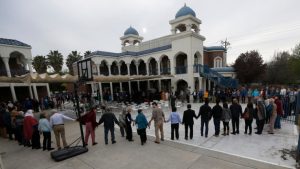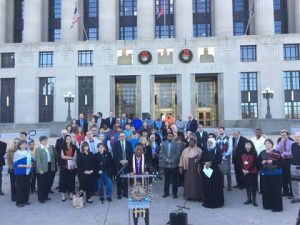Answer
Salam Dear Sister,
Thank you for your question and for contacting Ask About Islam.
This is a topical question considering the times we are in and the problems facing Muslims. You have chosen a question which, if followed, could do a lot to offset the anti-Muslim/ anti-Islam feeling that appears to be prevalent.
The Quran informs us all of mankind is descended from one couple, Adam and Eve. Therefore we are brothers and sisters in humanity, and our differences in languages and colors are but a mercy that we might know one another. Language and race should never be the bases for discriminating against people.
“O mankind! We created you from a single (pair) of a male and a female and made you into nations and tribes that you may know each other (not that you may despise each other). Certainly the most honored of you in the sight of Allah is (he who is) the most righteous of you. And Allah has full knowledge and is well acquainted (with all things).” [Quran 49:13]
“Worship Allah and join none with Him (in worship); and do good to parents, kinsfolk, orphans, Al-Masakin (the poor), the neighbor who is near of kin, the neighbor who is a stranger, the companion by your side, the wayfarer (you meet), and those (slaves) whom your right hands possess.” [Quran 4:36]
Who are our neighbors?
An Ansar (emigrant) came to Prophet Muhammad (peace and blessings be upon him) and said that he has recently purchased a house in a particular area and that his nearest person was such that he had no hope of any goodness from him and that he felt unsafe from his mischief.
Prophet Muhammad (peace and blessings be upon him) told Ali, Salman al-Farsi, Abu Zar Ghaffari and Miqdad Ibn Aswad to go to the Mosque and announce: “He is not a believer whose neighbor is unsafe from his mischief.”
They announced it three times and then Muhammad (peace be upon him) pointed towards forty doors to his right and forty to his left indicating that forty houses in all directions form ones neighborhood. One is obliged to observe their rights.
How are we to show our concern for our neighbors? We should ensure that our neighbors have the basic necessities, for a Muslim should not eat if his or her neighbor is going hungry. It means that Muslims should wish for their neighbors what they wish for themselves. It means sharing their happiness and sorrow.
Further, it means to not spy on them and respect their privacy, to not gossip about them, to not harm them in any way, and to keep common use areas – such as apartment building entrances, streets and sidewalks – clean.
Prophet Muhammad (peace be upon him) on the rights of the neighbor, said:
“It is to help him if he asks your help, to lend him if he asks to borrow from you, to satisfy his needs if he becomes poor, to console him if he is visited by an affliction, to congratulate him if is met with good fortune, to visit him if he becomes ill, to attend his funeral if he dies, not to make your house higher than his without his consent lest you deny him the breeze, to offer him fruit when you buy some or to take it to your home secretly if you do not do that, nor to send out your children with it so as not to upset his children, nor to bother him by the tempting smell of your food unless you send him some.” (The Scale of Wisdom, P.234/235 no.1308)
(This is the hadith I believe you were referring to and it is a composite of the two you mentioned.)
Abdullah Ibn Musawir narrated: “I heard Ibn Abbas mention Ibn Az-Zubair saying that he was a miser, then he said: I heard the messenger of Allah say:
“He is not a believer who eats his fill whilst his neighbor beside him goes hungry” (Al-Bukhari, hadith no.112, al-Hakim, vol. 4, p 167 a similar report given by al-Bazzar, hadith no. 119)
Neighbors have a special status in Islam. Islam encourages Muslims to treat their neighbors in a gentle way that reflects the true and genuine spirit of Islam as exemplified in its tolerant aspect especially with people of other faiths. It makes no difference whether the neighbors are Muslim or non-Muslim.
“By Allah, he is not a believer! By Allah, he is not a believer! By Allah, he is not a believer,” Prophet Muhammad (peace be upon him) said.It was asked, “Who is that, O Messenger of Allah?” Prophet Muhammad (peace be upon him) said:
“One whose neighbor does not feel safe from his evil.” [al-Bukhari and Muslim], (Sahih AL-Bukhari: Volume 8, Book 73, Good Manners and Form (Al-Adab), Number 45).
Prophet Muhammad (peace be upon him) said:
“The best of companions with Allah is the one who is best to his companions and the best of neighbors to Allah is the one who is the best of them to his neighbor.
Whoever believes in Allah and the Day of Judgment it is essential that he does not harm his neighbors …” (Al-Bukhari)
Mother of the believers Aisha, may Allah be pleased with her, reported that the messenger of Allah (peace be upon him) said:
“Jibril kept recommending me to treat my neighbor well until I thought that he would tell me to make him one of my heirs” (Al-Bukhari)
Practical Examples from the life of our Noble Prophet, Peace and blessings be upon him
- A man came to our noble Prophet and complained about his neighbor ill-treatment to him. For three times the Prophet advised him to be patient. The fourth time Our Prophet advised him, ‘Today is Friday. Go home and place your household baggage on the main street where people can see it. When they ask you the reason tell them that your neighbor’s behavior is unbearable. Thus, everyone will learn about your complaint.’
The man followed the Holy Prophet’s advice to the letter. Whenever people passed by him they would ask for the reason of his departure. Everybody refused the neighbors behavior. As soon as he learnt that his neighbor had decided to place his complains into the people’s court, and was apprising them of his behavior, he got unnerved, and begging forgiveness, requested him to take his baggage back to his house. He promised never to bother him again.
- Al-Tirmidhi (2470) narrated that a sheep was slaughtered at the time of the Prophet, peace and blessings of Allah be upon him, and given in charity except for its shoulder. The Prophet, peace and blessings of Allah be upon him) asked ‘A’ishah, “What is left of it?” She said: “Nothing is left except the shoulder.” He, peace and blessings of Allah be upon him, said: “All of it will remain except its’ shoulder.”
This means that whatever a person eats is that which is gone and no longer remains, but that which he gives in charity is what will remain for him with Allah and he will benefit from it on the Day of Resurrection. This hadith is a reference to the verse in which Allah says:
“Whatever is with you, will be exhausted, and whatever is with Allah (of good deeds) will remain” (Surah Nahl: 96)
- Abdullah bin `Umar, May Allah be pleased with them, reported: Messenger of Allah, peace and blessings be upon him, said, “The best of friends, in the sight of Allah, is the one who is best to his friend, and the best of neighbors, in the sight of Allah, is the one who is best to his neighbor”.
(Tirmidhi, hadith no. 1944, Ahmad, vol. 2,, p. 167, ad-Darimi, vol.2, p. 215 and al-Hakim, vol. 1, p. 164, with Sahih Isnad)
A Muslim recognizes the rights of his neighbors, as well as the etiquette that the neighbors must share with respect to one another. They must fulfill those aspects completely.
He should never harm his neighbor, neither by action nor by speech.
Allah’s Messenger (peace be upon him) said:
“Whoever believes in Allah and the Last Day should not harm his neighbor.” [Al-Bukhari and Muslim]
There is also the following Hadith:
“By Allah, he is not a believer, by Allah, he is not a believer.” It was said to him, “Who is that, O Allah’s Messenger (peace be upon him)?” He said, “The one from whose affairs his neighbor is not safe.”
Many things can contribute to disunity in the community like blocking a neighbors entrance, blocking his car, throwing one’s garbage in front of the neighbor’s house, playing music loudly, causing a disturbance, etc.
However, we have examples of Muslims taking an active role in flood relief in the UK, Muslim children helping pick up the rubbish left in parks and public places, and in Australia a group of high school Muslim boys in Sydney began mowing lawns and cleaning the yards of their elderly and disadvantaged neighbors. (1)
Good neighborly relations is exactly what our Prophet said it was: A joy in one’s life.
May Allah grant that the Muslims take an active role in their community, individually, and collectively through their local Masjid, and may they be rewarded by Allah for their contributions, Ameen.
I hope this helps answer your question.
Salam and please keep in touch.
References:
